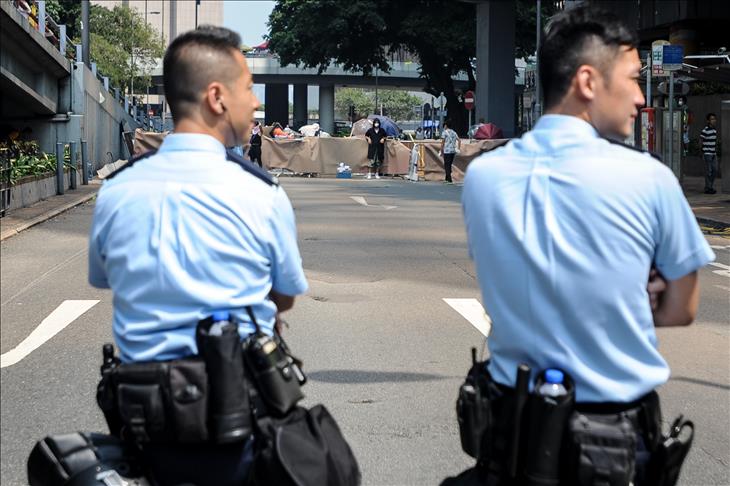HK police arrest 9 people on explosives offenses
Police suspect explosives intended to be detonated before Legislative Council debates reform package for 2017 chief executive election

HONG KONG
The day after several thousand pro-democracy supporters returned to the streets of Hong Kong, police say they have arrested nine radical activists on explosives offenses.
Early Monday morning -- after a police bomb squad carried out a controlled explosion on "unstable explosives" found at a vacant studio lot -- five men and four women from Hong Kong, aged 21 to 34, were swiftly arrested in a series of raids across the city.
The South China Morning Post reported police as saying Monday that they suspect that the explosives were intended to be detonated before the Legislative Council debates the government’s political reform package for the 2017 chief executive election this week.
The Chinese government says it will allow "one man, one vote" suffrage, but candidates will have to be approved by a body loyal to Beijing.
Protesters have been calling for a fully democratic vote with open nominations, and said Sunday that they will start to gather outside government headquarter to attempt to pressure pan-democrats to not pass the Chinese government's plan.
They say the rally will run through to the end of the week, when lawmakers are expected to vote.
An unnamed police source told the Post that those arrested Monday were core members of a local radical group, which had discussed launching a bomb attack online.
"Some of them were picked up in the vacant studio [in Sai Kung] when they allegedly tried to make homemade bombs and tested the power of the devices," he said.
They added that the chemical substance triacetone triperoxide -- an explosive known as TATP -- was confiscated along with air guns during the raids.
One test tube of the explosive was powerful enough to "blow a car into pieces," the source told the Post.
On Sunday, several thousand pro-democracy supporters marched in Hong Kong in the latest effort to urge the lawmakers to vote against the Beijing-backed elections -- a gripe that last year led to an 11-week standoff on the territory's streets.
The South China Morning Post reported that the turnout had however fallen short of expectations.
Organizers put the drop down to public feeling that the battle to encourage lawmakers to vote against Beijing control may already be won.
"It might have to do with the recent reverse in public opinion [according to surveys conducted by universities]. People now feel more confident that the proposal will be voted down," Sam Yip Kam-lung of the Citizens Against Pseudo-Universal Suffrage Campaign, told journalists after the march.
"People might have decided to save their energies for later," he added.
The Post reported Sunday that all 27 pan-democratic lawmakers have vowed to vote against the proposal, as they consider it a package of false democracy under Beijing's framework.
The Hong Kong government needs at least four pan-democratic votes to get the package past a Legislative Council vote.
The 2014 protests, which involved more than 100,000 people at their peak, were seen as one of the most serious challenges to China's authority since the 1989 Tiananmen Square protests that ended with a bloody crackdown in Beijing.
Anadolu Agency website contains only a portion of the news stories offered to subscribers in the AA News Broadcasting System (HAS), and in summarized form. Please contact us for subscription options.



